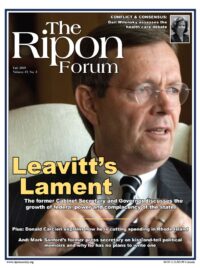
Sex, lies and an ethics investigation.
With all the ingredients present for a political tell-all novel about my time as Governor Mark Sanford’s communications director, I’ve had a number of people ask when the book is hitting the shelves.
Most are a little surprised when I tell them it was never something I gave serious thought to, though it wouldn’t be true to say it didn’t at least cross my mind. After all, an inside-perspective novel after a public implosion is just as much a part of the formula these days as the scripted public confession alongside the wronged-but-supportive spouse. Incidentally, it doesn’t look like any of those conventions will end up being followed in the Sanford case.
So as much as I would love for people to associate me with the picture from my book jacket rather than the picture of me literally pulling my former employer away from a podium and a media scrum, that’s going to have to wait.
Simply put, I fundamentally believe it isn’t appropriate for former aides to cash in by writing kiss-and-tell novels. I don’t mean to indict or condemn those who have written these books, but I think it’s a trend that should end for a few reasons:
Why does the desire to tell people “the whole story” only hit once someone has left an administration or a campaign? Pardon the cynicism, but I have a hard time buying the high-minded talk of transparency and openness from many who’ve written such projects.
With all the ingredients present for a political tell-all novel about my time as Governor Mark Sanford’s communications director, I’ve had a number of people ask when the book is hitting the shelves.
Any political organization is a team effort, and decisions are made every day about what parts of those inner workings will and won’t be discussed publicly. If you don’t like the decisions, you leave, period. But when authors later recount episode after episode worth telling to the public years after they occurred, it leaves the impression that the only reason they stayed as long as they did was to accumulate anecdotes.
Obviously, an enormous caveat to the above would be revealing evidence of wrongdoing or malfeasance. But there again, is a highly-publicized novel the appropriate venue for revealing such, and are you really acting in the public’s best interest by doing so? More likely, the motivation is moving up the best seller list. If you know of potential legal breaches, you have an obligation to report them when they happen, not when it is most profitable.
As old fashioned as it sounds, I also believe in the idea that you ought to treat someone how you would want to be treated in similar circumstances. If someone places their trust in you, you’re faced with a clear choice of either validating or violating that trust.
A critic of this rationale would say that the ultimate trust placed in a staffer is that of the taxpayer who is providing their salary. And that is absolutely true. But taxpayers elect officeholders, not staffers. By serving that officeholder, you are fulfilling the role the taxpayers are paying you to fulfill. If those same taxpayers decide that they’re not happy with what decisions are being made and how those decisions are being made, that’s what the ballot box is for – and it’s the responsibility of a free and strong press to give voters the information they need to hold officials accountable. It’s not up to a single staffer to unilaterally veto the decisions made by the team he or she was a part of. Most professional athletes would lose their credibility in similar circumstances (see Jose Canseco).
Most are a little surprised when I tell them it was never something I gave serious thought to, though it wouldn’t be true to say it didn’t at least cross my mind.
But perhaps the worst part of this trend is the degree to which these books have contributed to the tabloidization of American politics. Let’s face it – these novels typically aren’t weighty discussions of policy nuances, and instead bear a closer resemblance to airport fiction.
It’s undeniable that there’s been a marked degradation of discourse surrounding government and politics. Average people from my generation couldn’t tell you three substantive policy accomplishments of the Clinton Administration – but they could tell you heck of a lot about Monica Lewinsky.
I’m certainly not laying the blame for that at the feet of tell-all authors. I’m a free-market guy, and it’s clear that these books are filling a demand in the marketplace. But just because you have a right to do something doesn’t make it the right thing to do, and these authors ought to ask themselves whether their work is serving to elevate politics in this country, or diminish it in the eyes of those it is intended to serve.
Joel Sawyer is the former Communications Director to South Carolina Governor Mark Sanford. He owns a communications consulting and public relations firm, New Level Strategies, and can be reached at joel@newlevelstrategies.com.




